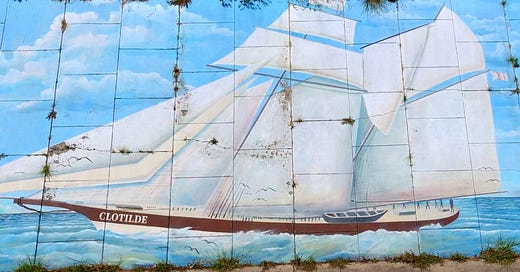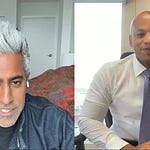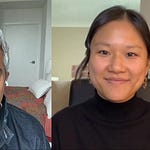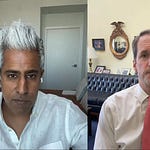Dear friends,
Since the beginnings of this experiment in newslettering, many of you have made the same request over and over: Can we get these interviews in the form of a podcast?
Today, at last, the answer is: Yes!
Starting today, with my interview with the journalist Nick Tabor, I’m going to offer an abridged, partial text transcript of my conversations for everyone on the free list — and a full-length audio podcast version for everyone who is a paying subscriber.
You asked — and we figured it out eventually!
If you’re on the free list, you’ll get a short preview of the audio conversation above, and you can check it out and decide whether to take the plunge and join us.
Now on to my conversation with Nick Tabor, an indefatigable reporter who is just about to publish an important book, Africatown, about the last group of enslaved Africans to cross the Middle Passage to America, the free community they built after the Civil War, and how, even as slavery receded into history, exploitation reinvented itself — most recently, in the form of environmental racism.
“It was sort of all too easy to continue oppressing them”: a conversation with Nick Tabor
I want you to start by telling us the story of the ship the Clotilda.
It starts in the 1850s in Mobile, Alabama. Mobile was one of the largest port cities in the U.S. The cotton trade was booming. There was a serious labor crunch in Mobile, and they couldn't get enough slave labor. Slaves were very expensive. It had been illegal for half a century to import captives from West Africa. You can only buy them from within the U.S., but many people had successfully brought in illegal slave voyages, and one U.S. president after another had sort of turned a blind eye.
So in the late 1850s, there was this rumor that the Buchanan administration was going to crack down on this illegal trade. This businessman in Mobile named Timothy Meaher — who's a lumber magnate, and reminds me of Thomas Sutpen from Absalom, Absalom! and, to some extent, some of the Silicon Valley billionaires — told some associates that he was pretty sure he could bring in an illegal slave ship. No one will be hanged, he said. It was going to be a sort of act of political protest.
So he made arrangements with this ship captain he knew, a ship carpenter named Bill Foster. He contracted Foster to go to the Gulf of Guinea and bring back what ended up being 110 captives. These people came from what was Yorubaland at the time, and what is Nigeria now. It was about seven weeks. They were on the Middle Passage. Of course, it was just an absolutely horrific voyage. So then they got back, and the ship came up into the Mobile delta. The captain burned it down to the water line and sank the rest to destroy the evidence. It was like an open secret in Mobile that this had happened. The news was reported within a day or two, and it immediately went global. I suspect that Tim Meaher may have tipped off the press, but we don't know.
This is the last slave ship to cross the Middle Passage. Because of that timing, 1860, to 1865, when the Emancipation Proclamation was signed, these particular people who came on the ship had five years in the American slavery system and then were emancipated. What happens to them next in 1865?
Well, they had nowhere to go. They had no way of getting back to West Africa. There was nothing they wanted more than to go back home. They saved up some money and approached the captain, Bill Foster, and asked him if they could pay him to take them back. He was like, That’s not nearly enough money, and there's no way you're going to be able to pay me what I would charge for something like that, so forget about it. They ended up continuing to work for the Meaher family and for other industrial magnets around Mobile. They were able to save up enough money by pooling their wages to buy some land, and they helped each other build houses and created this community where they could speak Yoruba and appoint their own leaders, and could be left alone for a long time.
So they called this place “Africatown.”
It was called African Town in the early years, at least by white journalists, but I think pretty widely it was known as Africatown” or the African Village. That name sort of died down for a lot of the 20th century. If you talk to people who grew up there, they'll say they didn't use that name growing up. But then it was brought back about 50 years ago, really, as sort of a political project by a neighborhood activist who wanted to revive the community.
In the days of the late 19th century, what would've distinguished this particular community of formerly enslaved people from others one might have encountered across the South?
For one thing, this is the only community that was founded by Africans who were
immediate survivors of the transatlantic slave trade. From that perspective, there's just no other site like this in the U.S. But the lore in the community now is that they knew more about being free than they did about being slaves. Some of them were 18, 20, or 22 years old. When they were brought over, they had been free for their entire lives. Their period of being slaves was just really a small part. So they knew how to hunt, how to fish, and how to garden. The lore is that they taught American-born freed people how to do those things and how to live as freed people.
How did you come to the story of this community as a journalist?
In 2018, when I was at New York Magazine, Barracoon by Zora Neale Hurston was being published. It had been in a vault for 90 years. Barracoon consists of Hurston's interviews with Cudjo Lewis, who was one of the last survivors still living of the Clotilda voyage. She went down to Mobile in 1927 and '28 and spent a bunch of time interviewing him. My editor called me in one day and said, "Hey, we're going to publish an excerpt of this book, and it would be really nice if we could have another story alongside it explaining what became of the descendants of Cudjo Lewis.” That turned out to be easier said than done because the descendants had not made themselves known.
I made a lot of phone calls around Mobile, and I learned about the Africatown community as I was looking for them, and, eventually, I got one of them on the phone. His name is Gary Lumbers, and he lived at the time just outside of Philly. Immediately, he said, pretty forcefully, "You don't need to be writing about the descendants. You should be writing about the neighborhood." He said, "When I was a kid, it was thriving. It was a great place to grow up, but now it looks like a war zone. It's full of pollution. The population has dwindled, and a lot of the housing stock is falling apart. What did they do to it?"
This started as a story of newly freed people creating this community and the giant oppression of slavery. But, as you said, and as your subject was telling you, the current issue of the moment was pollution and environmental racism.
Can you talk about the line from the kind of oppressions of the past to the kind of environmental oppressions of the present and the through line you discovered through your reporting?
In a way, that is the question of the whole book. To me, it all goes back to Reconstruction and the failure to give the freed people something like 40 acres and a mule because that left the economic structure of the Old South intact. One of my favorite Americans is Thaddeus Stevens, one of the radical Republican legislators who gave a speech in 1867 saying what we need to do is seize the plantations, break them up, give all the land to the Black people, and the Southerners are going to hate us for it, but who cares? Let them hate us. And I think that's what you would've needed to do to break up that hierarchy entrenched there. Obviously, it didn't happen.
Beginning in the 1920s, you have the paper industry from up north deciding to start setting up operations in the South. They have these rivers, they have these lush forests in the South, it has all the environmental resources they need and it has cheap labor because there are no unions in the South. They can just buy off the governments, and naturally the cheapest places for them to set up these factories, if they're just trying to take the path of least resistance, are Black communities like Africatown.
This company, International Paper, built a factory on land that belonged to the descendants of Timothy Meaher, the guy who brought the slaves over in 1860, and then a second paper factory set up shop also on the Meaher's property just under 10 years later. And for decades after that, these companies emitted just insane amounts of pollution in the water, contaminating the fish that people were eating to feed their families, contaminating the air, contaminating the soil. And when these factories were built, the people had no choice in the matter. It's not like they could insist on zoning laws or something. They had no money, and they didn't have voting rights. So it was sort of all too easy to continue oppressing them.
You moved to Mobile, Alabama in 2019. Tell me about moving to report this story for a period of years and what that was like.
From the moment that I conceived of doing the book, the idea was to move down. I knew there was no way I was going to be able to tell the story properly if I didn't.
I left my job at New York Magazine, left my apartment in Brooklyn, and moved to Mobile. I'm a white journalist, and of course, I had approached people I met in Africatown before and asked them, "What would you think about me doing this?" The response I got pretty much universally was, “We need all the help we can get. If you're going to do a responsible job of it, then we would love to have you.”
I want to kind of go a little deeper into what you just said, which was so interesting to me about you asking people in the community as a white journalist.
There's been so much discussion in recent years about who gets to tell what stories. My own answer personally has been that if you do the legwork and the kind of work you did in this book, you get to tell whatever story you want to. How did you wrestle with that?
One thing that I kept thinking about was that if you want a community like this to be able to make its own decisions, and if you think that the residents themselves should be able to determine their own future as a community, then they get to tell their stories to whomever they want. That's not to say that a journalist couldn't be unscrupulous about it and betray their trust or take advantage of them.
These people are smart, but, still, they get a lot of journalists coming down. They're used to going through the beats telling a standard version of the story. They're happy to tell it to whoever comes. That was ultimately their choice, and if they wanted to trust me with their stories, then they had the right to do that.
A few years ago, in Ta-Nehisi Coates’ “The Case for Reparations” essay in The Atlantic, one of the major points he made in that really important essay was the compounding nature of the debts. That it wasn't just about slavery, but the ways in which slavery reinvented itself in subsequent forms of oppression from Jim Crow to housing to voting rights being stripped away, and how there was really this kind of compounding effect on people and on families.
You have, in a way, taken a biopsy of one very small patch of earth and looked at these compounding debts. How do you think about what reparation looks like when you look at not the whole country, but one very specific patch of earth?
I have thought about it a lot. I just keep being afflicted by the sense of tragedy and sorrow above all. It's hard for me to even talk about making things whole again when I think about the depth and breadth of the injustice here. In a way, there's just no coming back from it. I mean, so many people in this community have died of cancer. We don't have the data to prove that there was a cancer epidemic, but by all anecdotal accounts, cancer has swept through this community. If you walk around there and ask anyone you meet on the street about their family history with disease, in my experience, they can rattle off numerous people, parents, siblings, and cousins who have died from cancer.
To even talk about reparations in that context, I have to say it feels futile. But I do think that starting to take the people seriously and asking them what they want to see for their community's future is the first step. One of the first things that you'll hear is that they don't want to be breathing in pollution anymore. They don't want their houses to be next to rock quarries. They don't want truck depots to be built in their backyards, which has been a threat in recent years. To at least stop hurting them and stop killing them. To strip away the heavy industry that's there and come up with a plan to bring jobs to the community. Politically, and knowing the way things are in Mobile, it seems hugely ambitious, and it's hard for me to even extend my imagination beyond that.
Nick Tabor is a freelance journalist and the author of “Africatown: America’s Last Slave Ship and the Community It Created,” which will be published next month.
To access the full audio podcast version of this conversation, become a paying subscriber today.
Photo: Mobile.org
Listen to this episode with a 7-day free trial
Subscribe to The.Ink to listen to this post and get 7 days of free access to the full post archives.














